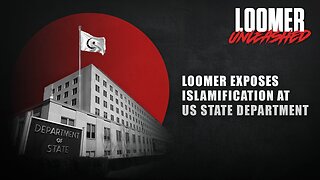Premium Only Content

Dr. Myles Munroe: Ideology, Philosophy, and Divine Purpose in Government and Cultural Colonization
Brethren! We are taking on the Summary of [THE IDEOLOGY AND PHILOSOPHY IN GOVERNMENT by Dr. Myles Munroe]
Understanding Ideology and Philosophy in Government: Insights from Dr. Myles Munroe on Divine Purpose and Cultural Colonization
Understanding the role of ideology and philosophy in governmental structures.
- Every government operates on a foundational ideology or philosophy, shaping its principles and governance.
- God's intention is to manifest the culture of heaven on earth through the establishment of divine government.
God's plan is to establish heaven's culture on earth through order.
- British colonial governance mirrored the concept of bringing one's culture and order to foreign lands, exemplified by similar government mansions.
- The Holy Spirit, as God's governor, aims to impose divine order on earth, reflecting the garden's structure versus chaos.
Government based on God’s principles promotes righteous leadership.
- Leadership acknowledging God yields moral governance aligned with natural and divine laws.
- Philosophy profoundly impacts government, evidenced by prophetic references to Jesus as a bringer of governance.
Ideology shapes individual actions and government systems significantly.
- Individual philosophies can lead to drastic consequences, as illustrated by a young boy who became a notorious leader.
- Modern leadership philosophy often stems from Greek ideology, emphasizing inequality among humans and divine selection of leaders.
Historical influences of Roman ideology shape modern perceptions of race and governance.
- The breakup of the Roman Empire led to the formation of European kingdoms, which perpetuated Roman philosophical doctrines.
- Colonization and the dehumanization of Africans stemmed from a belief system that portrayed them as less than human.
Government's foundation ties to Greek philosophy and its impact on slavery and freedom.
- Abraham Lincoln's assassination highlights the deep-rooted issues of slavery and government complicity.
- Haitians' struggle for freedom against oppression reflects the consequences of philosophical ideologies on government policies.
Philosophy impacts how individuals perceive and treat others in management.
- Hierarchical attitudes can stem from inherited societal biases, leading to discrimination based on traits like skin color.
- True leadership requires self-awareness and understanding; you can only guide others as far as you've developed yourself.
Jesus presented a revolutionary philosophy of servant leadership.
- He emphasized that true greatness comes from serving others, contrasting with the Roman view of power.
- Many followers are unaware of their philosophical biases, shaped by cultural influences rather than pure biblical teachings.
Philosophy shapes leadership decisions and belief systems.
- Every government reflects the underlying philosophy of its leaders, influencing their choices.
- Belief systems evolve from collected ideas, demonstrating how new environments can alter personal philosophies.
Ideas outlive leaders, shaping society long after their creators die.
- The power of ideas, originated by thinkers like Plato and Aristotle, continues to influence governance.
- Attempts to eliminate a philosophy or ideology often lead to its proliferation, as seen with martyrdom and terrorism.
Leadership without Christ leads to dangerous ideologies.
- Personal knowledge of Jesus Christ is essential for leaders to align with biblical principles.
- Philosophy is shaped by ideas, and early exposure to moral teachings influences behavior.
Philosophy shapes our beliefs and perceptions of truth.
- Philosophy involves loving and believing in one's own thoughts, which can lead to a strong belief system.
- Historical examples, like Hitler's ideology, show how a person's philosophy can greatly influence societal norms and actions.
Philosophy shapes beliefs, behavior, and ultimately, one's identity.
- Our beliefs stem from our thoughts, which influence how we treat others and perceive the world.
- Exposure to external ideas and media impacts our belief systems, forging our identity and actions.
Importance of leadership in shaping ideas and governance.
- Dr. Myles Munroe emphasizes the necessity of evaluating thoughts against the knowledge of God, implying that critical thinking is essential in governance.
- Referencing Plato and Aristotle, he highlights that effective leadership requires education to influence national thought and decision-making.
Trust is essential, and love should not lead to blind loyalty.
- True trust takes time to build, and skepticism is necessary to avoid deceit.
- Leadership should not rely on threats or violence; love should be prioritized without compromising safety.
Government quality hinges on the governing leaders' philosophies.
- The effectiveness of a government is directly influenced by the philosophical beliefs of its leaders and officials.
- A leader's belief system shapes their approach to leadership and ultimately affects how power is exercised.
Philosophy shapes the use of power in government.
- Voters should understand candidates' beliefs before granting them power.
- Philosophical beliefs influence decisions on important issues, such as human rights and equality.
Leaders' philosophies shape laws and societal values.
- Human dignity is essential; valuing all individuals fosters a humane society.
- Personal beliefs influence public life, highlighting the responsibility of leaders to uphold righteous values.
Correction through the Word of God is essential for personal growth.
- Living a contaminated life affects oneself and others, requiring a radical change in behavior.
- Rebuke is necessary for discipline; it reflects love and leads to spiritual and personal improvement.
Your belief system should be shaped by the Word of God.
- Faith is influenced by what you hear, emphasizing the importance of choosing positive and godly sources.
- Be mindful of the influences in your life, as harmful ideas can stem from negative friendships and media consumption.
The challenges faced by widows highlight the importance of community support.
- In Jesus' time, widows relied heavily on family and community for support and survival.
- The story illustrates the widow's plea for justice, emphasizing the role of righteous governance in protecting rights.
Healing encompasses all forms of dis-ease in life.
- Financial, relational, and physical sicknesses are all forms of dis-ease that can be healed.
- The spirit of God is essential for true healing and restoration, as emphasized by biblical teachings.
The importance of justice over favor in seeking help.
- Begging implies desperation, while pleading asserts entitlement to justice.
- Justice is a legal right, not influenced by emotions or personal views.
Empowerment and justice through faith against adversaries.
- Individuals have the right to claim deliverance and face adversities with confidence.
- Persistent prayer and faith are essential for achieving justice and overcoming challenges.
God's justice is coming to address personal struggles directly.
- The speaker emphasizes that God will intervene personally to bring justice and resolution in people's lives.
- Believers are encouraged to assert their rights as citizens of God's kingdom, proclaiming their desire for justice and healing.
Persistent faith is essential for receiving justice.
- Justice requires continuous prayer and perseverance, even when faced with refusals.
- Understanding one's rights in faith empowers individuals to keep seeking what is just.
Transforming followers into leaders for effective change.
- Encouraging individuals to take initiative and lead by example.
- Fostering a mindset of empowerment and responsibility among followers.
Praise God almighty! Amen!
We dive into Key Insights on [THE IDEOLOGY AND PHILOSOPHY In GOVERNMENT by Dr. Myles Munroe]
Understanding Ideology in Government
- Ideology forms the foundation of every government, influencing its structure and operations.
- The Kingdom of God is presented as a government with a specific ideology rooted in divine principles.
- All nations are built upon underlying philosophies that shape their laws and culture.
The Role of Philosophy in Leadership
- A leader's philosophy significantly impacts their approach to governance and decision-making.
- The beliefs held by leaders guide their treatment of others and their understanding of justice and order.
- Historical figures like Adolf Hitler illustrate how dangerous ideologies can lead to catastrophic consequences when leaders adopt harmful philosophies.
Colonization and Culture
- God's original plan was to establish the culture of heaven on earth through colonization.
- Colonization involves the transfer of cultural values and practices from a governing entity to its territory.
- Historical examples, such as British colonization in the Caribbean, show how a government's culture can shape the identity of its colonies.
Philosophy as a Foundation for Law
- Laws in any society reflect the philosophical beliefs of its leaders, which in turn shape national culture.
- The Bible serves as a constitution that influences moral and ethical laws, emphasizing righteousness and justice.
- An effective government should align its laws with divine principles to ensure justice for all citizens.
Leadership and Human Value
- Philosophy determines how leaders perceive and treat individuals, influencing societal values regarding equality and human rights.
- The oppressive ideologies of the past have perpetuated systems that devalue certain groups of people.
- A just leadership philosophy recognizes the inherent worth of all individuals, irrespective of their background.
Influence of Historical Philosophers
- Greek philosophers like Plato and Aristotle have shaped modern leadership ideologies, often correlating power and birthright.
- Machiavelli’s teachings suggest that deceit and violence can be justified to maintain power, reflecting a dangerous leadership philosophy.
- Leaders today must critically evaluate the philosophies they adopt to avoid repeating history's mistakes.
The Importance of Righteous Leadership
- Righteous leadership is characterized by humility, service, and a commitment to justice.
- The quality of government is directly linked to the moral philosophy of its leaders and their willingness to serve the community.
- Effective governance requires leaders to embody principles that promote justice, mercy, and the well-being of all citizens.
Praise God almighty! Amen!
Brethren, it is time to switch into spiritual analysis on [THE IDEOLOGY AND PHILOSOPHY IN GOVERNMENT by Dr. Myles Munroe]
Understanding Ideology and Philosophy in Government
Dr. Myles Munroe emphasizes the significance of ideology and philosophy as foundational elements in the structure of government. He argues that every government operates based on a set of philosophical principles, which shape its actions and policies. These ideologies not only guide governmental systems but also influence the lives of citizens.
The Concept of Government as a Kingdom
Munroe presents the Kingdom of God as a prototype for governance, asserting that it embodies a unique ideology. The divine purpose of God, according to him, was to establish a heavenly culture on Earth. This involves the creation of a colony that reflects heavenly values, where the Holy Spirit serves as the governor administering God’s laws. This perspective posits that earthly governance should mirror divine principles to ensure a just society.
Colonization of Ideas and Culture
The discussion extends to the idea of colonization, not in a geographical sense but rather in terms of ideas and culture. Munroe argues that successful colonization involves the dissemination of a culture that aligns with the governing ideology. He draws parallels from historical events, such as British colonization in the Caribbean, highlighting how cultural similarities arose due to shared governance.
The Role of Philosophy in Leadership
Philosophy plays a crucial role in shaping leadership. Munroe stresses that leaders govern based on their philosophies, which in turn affect how they treat others. He warns against the dangers of philosophies rooted in oppression, referencing historical figures like Adolf Hitler, whose ideologies led to catastrophic consequences. The leader’s philosophy directly influences the laws and cultural norms that govern a society, impacting the overall quality of governance.
The Importance of Righteousness in Governance
Another critical aspect Munroe addresses is the need for righteousness in leadership. He asserts that leaders who align with divine principles foster a culture of justice and equity. This alignment with God’s laws ensures that governance reflects compassion and fairness, ultimately benefiting society as a whole.
The Impact of Ideas on Human Behavior
Lastly, Munroe discusses the power of ideas in shaping human behavior and societal structures. He argues that ideas, once adopted, can dictate actions and policies within a government. This highlights the responsibility of both leaders and citizens to critically evaluate the ideologies they embrace, as these beliefs will manifest in their governance and daily interactions.
In conclusion, Dr. Myles Munroe’s insights on ideology and philosophy underscore their critical role in forming effective governments and fostering a just society, urging the need for alignment with divine principles to achieve true justice and righteousness in governance.
Praise God almighty! Amen!
-
 9:56
9:56
Mountain of Deliverance
5 months agoDeliverance Prayers for Overcoming Foundational Battles with Dr DK Olukoya
61 -
 2:14:18
2:14:18
The Pascal Show
12 hours ago $0.40 earnedTHEY LIED TO POLICE AGAIN? Jake & Rebecca Haro Have Lost Their Minds! Emmanuel Haro Search Continues
4.66K -
 1:25:52
1:25:52
TruthStream with Joe and Scott
2 days agoSG Sits Down w/ LT From "And We Know": An 80K FT View of Humanity's Great Awakening from 8/22/2025
15.8K16 -
 15:54
15:54
Lacey Mae ASMR
11 hours ago $0.68 earnedASMR For Sleep in 15 Minutes!
9.13K4 -
 3:16:38
3:16:38
Price of Reason
12 hours agoTrump FIRES Fed Governor Lisa Cook! Cracker Barrel CRISIS Continues! James Gunn DCU Woes! Gamescon!
111K7 -
 2:25:01
2:25:01
FreshandFit
6 hours agoTyreek Hill Pays Ex Wife $1 Million in Ongoing Fees From Divorce?!
34K3 -
 2:03:46
2:03:46
Inverted World Live
8 hours agoHaunted Dolls Hack Amazon Alexa | Ep. 98
106K2 -
 3:09:53
3:09:53
Laura Loomer
8 hours agoEP140: Loomer EXPOSES Islamification At US State Department
35.7K12 -
 3:05:00
3:05:00
TimcastIRL
9 hours agoTrump Floats Accepting 600,000 Chinese Student Visas, MAGA Uproar | Timcast IRL
213K159 -
 8:44:47
8:44:47
SpartakusLIVE
14 hours ago$20,000 Hide and Seek Tourney w/ Stonemountain64 || #1 Rat wins the BIG CHEESE
71K